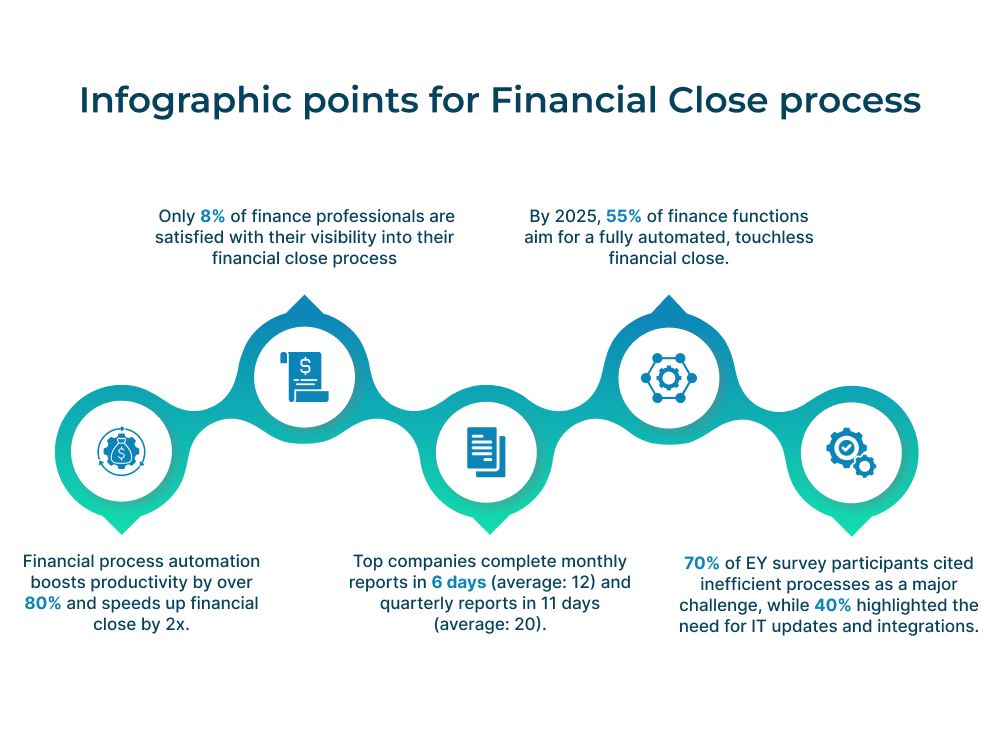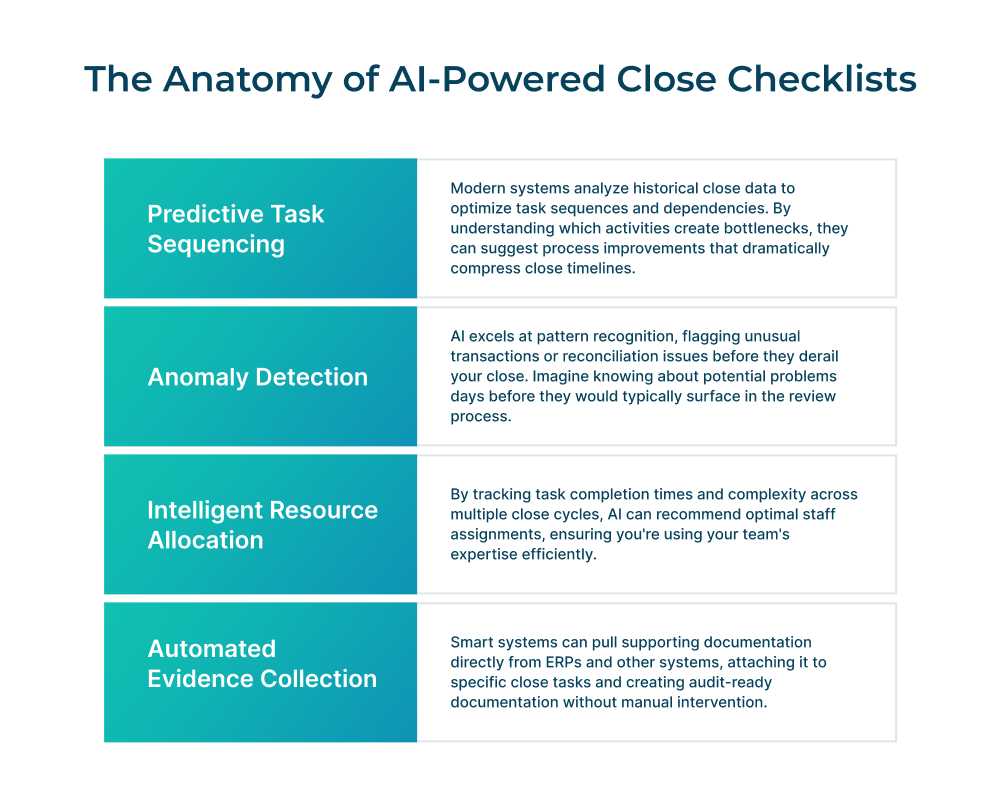Financial Close Management
AI-Powered Close Checklists: How Smart Workflows Are Transforming Finance Operations
Discover how AI-powered close checklists and smart workflows are revolutionizing finance operations by enhancing accuracy, efficiency, and compliance.

Amrit Mohanty
Mar 18, 2025 (Last Updated: Jun 11, 2025)

The month-end close process has always been a headache for accounting teams, often turning into a frantic rush of spreadsheets, missed steps, and late nights. But AI-powered checklists and intelligent workflows are changing the game, streamlining reconciliations, and reducing chaos. Last year, the banking sector also embraced generative AI in a big way. Interestingly, only 8% of banks approached it systematically, while a significant 78% adopted it tactically—showing how the industry is exploring AI to enhance financial operations and efficiency.
Let's face it—the traditional close process is ripe for disruption. For years, finance teams have relied on static checklists, manual tracking, and institutional knowledge that walks out the door when employees leave. The result? Inconsistent processes, compliance risks, and a whole lot of unnecessary stress. However, AI-powered close checklists and smart workflows are transforming finance operations, bringing automation, accuracy, and efficiency to a historically chaotic process. Let’s explore more!
The Evolution of Financial Close Processes

When we look back at how financial close processes have evolved, the journey has been remarkable. Many seasoned finance professionals can remember the days of purely paper-based reconciliations, where physical binders and endless spreadsheet printouts dominated the landscape. The transition to digital spreadsheets represented the first major evolution, bringing better organization and reducing some manual calculations.
The next significant leap came with the introduction of specialized close management software, offering centralized task tracking and standardized workflows. However, these systems, while helpful, still relied heavily on human judgment and manual intervention at critical junctures. In fact, a Gartner, Inc. survey of finance executives conducted a few years ago predicted that 55% of respondents aimed to achieve a touchless financial close by 2025.
Today, we're witnessing the next transformative wave: AI-powered close checklists and smart workflows that don't just organize the close process but actively enhance it through automation, pattern recognition, and predictive capabilities.
The Anatomy of AI-Powered Close Checklists
Today's AI-powered close management platforms go far beyond simple task tracking. They're actively helping finance teams work smarter:

Real-World Impact
The benefits extend beyond just efficiency. Companies implementing these technologies report concrete business outcomes:
First, there's the dramatic compression of close timelines. Organizations that previously took 10+ days to close their books are now completing the process in 3-5 days. This acceleration means faster delivery of financial insights to business leaders when they need them most.
Second, there's improved accuracy. With AI monitoring for anomalies and automated cross-checks, material errors in financial statements have declined significantly for early adopters. Interestingly, the AI in the fraud detection market is expected to grow at a compound annual growth rate of 24.5%, thereby indicating an increasing reliance on AI to combat financial fraud.
Perhaps most importantly, finance teams report reduced burnout and improved job satisfaction. By eliminating the most tedious aspects of close processes, team members can focus on analysis and strategic activities that add more value (and are frankly more engaging).
Implementation Challenges
The transition isn't without hurdles. Many organizations struggle with:
- Process Documentation: Before AI can optimize your close, you need clear documentation of current processes, including unwritten rules and workarounds that may not be formally acknowledged.
- Change Management: Finance professionals are often (rightfully) cautious about changing processes that affect financial reporting. Successful implementations require thoughtful change management and phased approaches.
- Integration Complexity: Your financial data likely lives across multiple systems. Ensuring your AI-powered close management platform can access all relevant data sources is often the biggest technical challenge.
The Future of Financial Close
Looking ahead, we're seeing the emergence of continuous close capabilities, where reconciliations and preliminary reporting happen throughout the month rather than in a compressed period after month-end. This approach, enabled by AI and automation, promises to eliminate the concept of a ‘close season’ altogether.
The most forward-thinking finance leaders are also exploring how Generative AI might transform financial reporting narratives, automatically drafting MD&A sections and other narrative financial disclosures based on the underlying data.
The Human Element Remains Critical
Despite these advances, successful close processes still depend on human judgment and oversight. The most effective implementations use AI to handle routine tasks while elevating finance professionals to focus on exception handling, analysis, and strategic decision support.
The finance professionals of tomorrow won't be replaced by AI—they'll be augmented by it, freed from spreadsheet drudgery to deliver the strategic insights businesses desperately need.
For finance leaders looking to remain competitive, the question isn't whether to adopt these technologies but how quickly they can implement them while maintaining the control and accuracy their stakeholders expect.
Conclusion: The New Standard for Financial Excellence
AI-powered close checklists and smart workflows are rapidly becoming the new standard for finance operational excellence. Organizations that embrace these technologies thoughtfully are discovering not just incremental improvements but transformative possibilities for their finance functions.
The most successful implementations recognize that technology alone is insufficient—the real power comes from combining AI capabilities with redesigned processes and upskilled finance professionals who can leverage these tools to deliver greater value to the organization.
As we move forward, the competitive advantage will increasingly belong to organizations that can complete financial closes not just accurately and efficiently but in ways that immediately translate financial results into strategic insights. AI-powered close processes are proving to be the critical enabler of this new standard of performance.
For finance leaders evaluating these technologies, the question is no longer whether to implement AI in close processes but how quickly and comprehensively to do so. The transformative potential is too significant to ignore, and the gap between early adopters and laggards continues to widen. The future of finance operations has arrived—and it's powered by intelligent systems working hand-in-hand with finance professionals to deliver unprecedented value.

